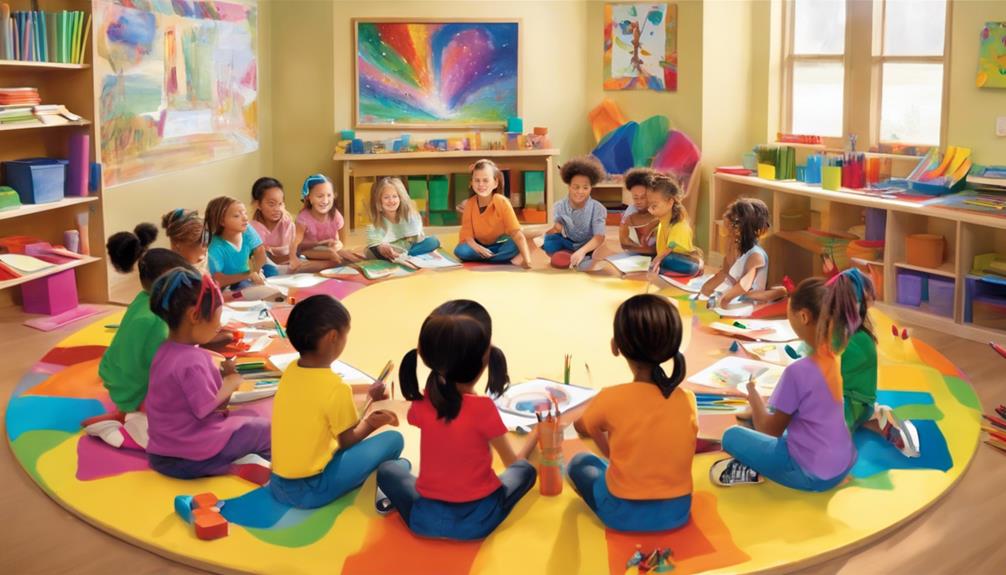As professionals in our field, we understand that approximately 40-50% of marriages in the United States end in divorce. This concerning statistic highlights the importance of addressing the impact of divorce on children.
When faced with such a significant life change, children require specific coping strategies tailored to their needs. By implementing effective communication techniques, emotional support, and routines, we can provide them with the tools necessary to navigate this challenging period successfully.
Join us as we explore practical ways to support children through the complexities of divorce and help them thrive despite the circumstances.
Key Takeaways
- Establish stable routines to provide security and control in children's lives.
- Listen actively, validate feelings, and offer constant reassurance of love and support.
- Encourage self-expression through safe spaces and celebrate children's emotional efforts.
- Seek professional help for specialized support, coping strategies, and addressing mental health concerns.
Communication Techniques
When explaining divorce to children, our goal is to use clear and simple language to help them understand the reasons for the separation. It's crucial to tailor our communication to be age-appropriate, ensuring that children grasp the main points without feeling overwhelmed. As parents navigating divorce, we must approach these discussions with an empathetic and compassionate mindset, acknowledging the emotions our children may be experiencing. By fostering open communication, we create a safe space for our kids to ask questions and express their feelings about the changes happening within the family dynamic.
Unity between parents during these conversations is key. Presenting a united front showcases to children that, despite the divorce, both parents still prioritize their well-being and happiness. Emphasizing love and reassurance throughout the communication process can help alleviate some of the anxieties children may be feeling. By addressing difficult questions with sensitivity and understanding, we can guide our children through this challenging time with empathy and support.
Emotional Support

As we navigate the emotional journey of divorce with our children, it's vital to encourage open expression of their feelings and provide unwavering support and validation. Here are some key ways to offer emotional support to our children during this challenging time:
- Listen Actively: Take the time to listen attentively to your child's concerns without judgment.
- Validate Their Feelings: Acknowledge and validate your child's emotions, letting them know that it's okay to feel the way they do.
- Provide Reassurance: Offer constant reassurance that your child is loved, cared for, and supported, no matter the circumstances.
- Build Trust: By encouraging your child to express themselves and being there to support them, you help build a foundation of trust that's crucial during this period of change.
Establishing Routines
Establishing routines is a crucial way to provide children with a sense of stability and security during the turbulent times of divorce. In the midst of uncertainty, routines offer children a familiar framework within which they can find comfort and predictability.
By adhering to consistent schedules for meals, bedtime, and activities, children can regain a sense of control over their daily lives, easing their anxiety about the changes brought on by divorce. These routines not only help children adjust to their new reality but also support their ability to focus on school work and other tasks despite the challenges they may be facing.
Through the structure provided by routines, children feel supported and cared for, knowing that certain things will remain constant even as other aspects of their lives are changing. Embracing routines fosters a sense of consistency and helps children in their adjustment process, offering them stability and security during a time of upheaval.
Encouraging Self-Expression

Navigating the emotional upheaval of divorce, children benefit greatly from avenues that encourage their self-expression. Here are four ways to support children in expressing themselves during this challenging time:
- Create a Safe Space: Establish a nurturing environment where children feel safe to share their emotions without fear of judgment. This safe space can be a designated area at home or through activities they enjoy.
- Encourage Various Forms of Expression: Children may express themselves through drawing, journaling, talking, or engaging in creative activities. Encouraging diverse forms of expression allows them to find what works best for them.
- Listen Actively: When children express themselves, actively listen without interrupting. Reflect back their feelings to show that you understand and validate their emotions.
- Celebrate Their Efforts: Praise their courage in expressing their feelings. Celebrating their efforts, no matter how small, boosts their confidence and encourages further self-expression.
Seeking Professional Help
Seeking professional help can provide children with invaluable support and guidance as they navigate the challenges of their parents' divorce. Therapists and counselors offer a safe space for children to express their emotions and work through coping strategies. These professionals are equipped to address mental health concerns and behavioral changes that may arise during this difficult time. By seeking professional help, children can receive specialized support tailored to their needs, helping them understand and process their emotions effectively. Here is a table to illustrate the benefits of seeking professional help for children going through divorce:
| Benefits of Seeking Professional Help for Children |
|---|
| Provides specialized support and guidance |
| Offers a safe space for emotional expression |
| Assists in developing coping strategies |
Accessing professional help can play a vital role in ensuring children receive the necessary support to navigate the challenges of their parents' divorce.
Frequently Asked Questions
What Are Coping Methods for Helping Children Adjust to Divorce?
We believe that children adjust to divorce better when they feel heard and supported. Encouraging open communication, maintaining routines, validating emotions, teaching coping skills, and involving both parents are vital strategies. Together, we can help children navigate this challenging time.
At What Age Is a Child Most Affected by Divorce?
As a team, we understand that the impact of divorce varies with a child's age. It's crucial to recognize that children at different stages of development experience divorce differently, from emotional turmoil to identity struggles.
What Is the Best Therapy for Children of Divorce?
The best therapy for children of divorce may vary based on individual needs. Consider Cognitive-Behavioral Therapy to address negative thought patterns, Play therapy for emotional expression, Family therapy for communication improvement, Art therapy for non-verbal expression, and Trauma-focused therapy for resilience-building.
How Preschoolers and School Aged Children Cope With Divorce?
We understand how preschoolers and school-aged children cope with divorce can be challenging. Young ones may focus on practical changes, while older kids seek reasons. Both benefit from open communication, reassurance, and stable routines.
Conclusion
In the midst of divorce, children need our understanding and support to navigate the emotional challenges they face. Just as a river flows smoothly through the twists and turns of life, we must guide them with love and empathy.
By using effective communication, providing emotional support, establishing routines, encouraging self-expression, and seeking professional help when needed, we can help children cope and thrive through this difficult time.
Remember, we're here to help them find their way to calmer waters.










